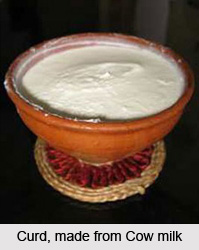 Curd is a dairy product consumed all over India. It is nutritious, healthy and universally useful food. It is formed by lactic fermentation of milk. The taste of curd is energizing and refreshing. Curd has innumerable health benefits.
Curd is a dairy product consumed all over India. It is nutritious, healthy and universally useful food. It is formed by lactic fermentation of milk. The taste of curd is energizing and refreshing. Curd has innumerable health benefits.
Preparation of Curd:
The curd is obtained by coagulating milk with organic compound or an edible acidic substance like vinegar or lemon juice and then draining off the whey or the liquid portion. Milk, which has become sour like raw milk alone or pasteurized milk with the addition of lactic acid bacteria, also produces curd naturally. The increased acidity causes the casein or milk proteins to tangle into solid masses or curds. The liquid part only contains whey protein. In cow milk 80% of the proteins are caseins.
In India, curd is a vegetarian food that is prepared by using yeast to ferment the milk. In Indian subcontinent, buffalo milk is used to prepare curd due to its higher fat content to make a thicker curd. The quality of curd depends on the starter used to curdle. The time for curdle also varies from season to season.
Uses of Curd in Cuisines:
Curd is almost used on a regular basis in the cuisines of Indian states such as Tamil Nadu, Kerala, Andhra Pradesh, and Karnataka. In these states, it is standard to eat curd rice at the end of lunch and dinner, which helps ease the effects of the spicy main dishes. It is also eaten in other parts of India as a raita or lassi during the summer season as it cools the stomach. Some of the names of dishes that are prepared using curd are Dahi Gosht, Dahi Bhindi, Dahi Baingan etc.
Health Benefits of Curd:
•According to Ayurveda curd has much beneficial value, especially in digestion.
•Curd is also used as a sacred symbol in all the Hindu rituals.
•Curd is easy to digest and it helps to improve digestion. It also helps in absorbing nutrients from other food items that one has eaten.
•It is healthy for the heart.
•Curd has good bacteria present in it which strengthens the immune system by fighting against several micro organisms that are present in the body.
•Curd has a high amount of phosphorous and calcium hence is good for teeth and bones.
•Curd is enriched with zinc, vitamin E and phosphorus hence it can be used as a skin care product.
•It can also be used to get rid of dandruff as it has lactic acid which has anti-fungal properties.
•Curd contains calcium which prevents the body from pumping more cortisol.
In fact, curd is reported to have better nutritive value than milk. Thus, including curd in the diet is a good idea. It not only improves health but also helps to keep the diseases away form the body.




















